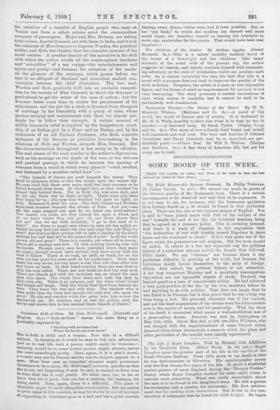Constance Beth-at-Once. By Alan McDougall. (Sherratt and Hughes. 6s.)—" Both-at-Once
" means the same thing as is poetically expressed by
"Standing with reluctant feet
Where the brook and river moot."
She is both a child and a woman. Now this is a difficult subject. In treating it, it would be easy to fall into affectation, just as in real life such a person might easily be tiresome,— certainly would be so, some cynical person might observe, unless she were exceedingly pretty. Then, again, it is a man's novel ; a Woman may see its literary merits, but its subject appeals to a man. More than once an impartial observer might pronounce Constance to be a minx; Mr. McDougall, however, satisfies us that She is net, not forgetting, it may be said, to remind us from time to time that she is very pretty. He takes care, too, to let us know that she is good ; that she has a passion, for instance, for being useful. Here, again, there is a difficulty. This piece of e.haractor might be made altogether commonplace. But our author is quite equal to the occasion, as may be shown by one of his ways of suggesting it. Constance goes to a ball and has a great success,
dancing every dance,—twice over, had it been possible. But in her "joy book," to which she confides her dearest and most secret hopes, she describes herself as leaving her triumphs to Make egg sandwiches for the guests. That would have been real happiness!









































 Previous page
Previous page